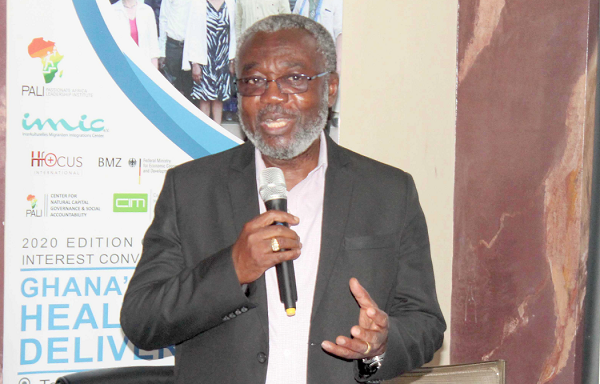
Govt to prioritise non-communicable diseases — Dr Nsiah-Asare
The government will continue the fight against the spread of the coronavirus disease (COVID-19), with special attention on the prevention of non-communicable diseases (NCDs), the Presidential Advisor on Health, Dr Anthony Nsiah-Asare, has said.
He said the focus on the prevention of NCDs was to help reduce the number of COVID-19-related deaths.
“We have realised that about 80 per cent of the people who unfortunately lost their lives were diabetic, hypertensive or a combination of other illnesses,” he said.
Dr Nsiah-Asare dropped the hint yesterday at the Nation Building Updates, a weekly event designed by the Ministry of Information to provide stakeholders with detailed updates on key interventions executed by the government.
The event, held on the theme: “Protecting lives and livelihoods in the midst of crises”, brought together members of the government’s COVID-19 Response Team to outline the successes chalked up in the management of the pandemic after Ghana recorded its first cases in March 2020.
Presently, the country’s COVID-19 active cases have further declined to 398, with 46,664 recoveries and 310 deaths.
Health promotion
Dr Nsiah-Asare said the government would ensure that health promotion and prevention was captured under the National Health Insurance Scheme (NHIS) to encourage adults to frequent health facilities for medical check-ups as a new way of living.
He said the government would establish 111 fully equipped hospitals across the country to bring health care closer to the citizens.
According to him, all those new measures were necessary because although the government had done remarkably well in managing the COVID-19, the country was not out of the woods yet.
Swift response
A Deputy Minister of Finance and Member of Parliament for Atiwa East, Mrs Abena Osei-Asare, who outlined the government’s response strategy, said its response to fighting the pandemic was swift, bold and effective, with a focus on protecting lives and livelihoods.
That, she said, had led to a significant drop in cases and deaths, compared to other countries.
“As of 19th October, 2020, the total number of infected cases stood at 47,372, with total recoveries of 46,664 and deaths of 310. Ghana’s COVID-19 Statistics translate into a recovery rate of 98.5 per cent and a death rate of 0.65 per cent. This compares favourably with the global recovery and death rates of 74.7 per cent and 2.8 per cent, respectively, and the African recovery and death rates of 82.1 per cent and 2.4 per cent, respectively,” she said.
Despite the government’s swift response to the outbreak of the pandemic, Mrs Osei-Asare said, there was still some socio-economic impact of the pandemic on the economy that would take time to be recovered.
For instance, she said, projected Gross Domestic Product (GDP) growth was revised from 6.8 per cent to 0.9 per cent GDP growth.
“The pandemic also affected our ability to collect revenue, as global and local economic activities slowed considerably; but on the other hand, more spending was incurred to address the pandemic, leading to an upward revision in the fiscal deficit from 4.7 per cent to 11.4 per cent,” she said.
Interventions
To help citizens overcome the socio-economic impact of the pandemic, Mrs Osei-Asare said, the government laid down a number of interventions to cushion households, firms, frontline health workers, students, among others.
She said the government was able to mobilise GH¢20.4 billion from local and external sources to fund the intervention programmes.
Some of the interventions, she said, were the formulation and implementation of a COVID-19 preparedness and response plan, including the provision of PPE, pharmaceuticals, the three Ts — testing, tracing and treatment — with 510,074 tests as of October 19, 2020.
She said the government also provided relief for health workers, including the waiver of personal income tax for all health workers for six months from April 2020, the provision of allowance of 50 per cent of basic salary for all health workers for four months (April, May, June, July) and the bussing of health workers in Accra, Tema, Kumasi and Kasoa to and from work for the duration of the lockdown.
With regard to households, the deputy minister said the government provided free electricity for life-line consumers from April to the end of 2020, 50 per cent discount on electricity bills for three months (April, May, June) for all non-lifeline consumers and a reduction of the Communications Service Tax (CST) from nine per cent to five per cent, effective September 2020, for households and firms.
